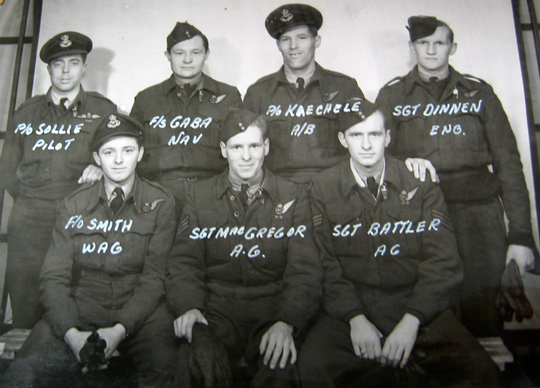
Most of this crew was killed when their Halifax aircraft iced up and crashed shortly after take-off from England on March 5, 1945, while on operations to Chemnitz. Sergeant MacGregor was absent on this mission and was replaced by Sgt. J.H. Waugh, the only crew member to bail out safely. [Veterans Affairs Canada]
After a three-day attack on the marshalling yards by U.S. bombers, British Bomber Command carried out four successive nights of raids.
The first, on March 5, saw 600 bombers, including 98 Canadian Halifaxes and 84 Lancasters dispatched.
It was so cloudy that sky markers, flares dropped with parachutes, were needed to guide the first bombers to their target. The glow of fires led the remainder.
Losing navigational aids shortly after take-off, navigator H.R. Gordon skilfully guided one Halifax to its target, but the crew had to bail out after furious attacks by enemy fighters. Despite his own wounds, Gordon helped a severely injured gunner off the plane. One crew member was lost, but the remainder reached the ground safely, most becoming prisoners of war. Gordon was later awarded the Distinguished Flying Cross.
The raids cumulatively destroyed about 60 per cent of the city, with heavy damage in the industrial areas. “Few, if any, factories in the area escaped,” said The RCAF Overseas.
For the Canadians of Group 6, the weather proved as deadly as the enemy; the RCAF lost 17 aircraft, six on the raid, seven crashing before the raid and four on the return, mostly due to icing.
It was “one of the heaviest blows ever suffered by the group in a single night,” according to the history.
Despite the long list of young lives cut short, there was one miracle survivor.
As his aircraft iced up, pilot R.F. Sollie ordered the crew to bail out. The Halifax crashed and exploded directly under gunner James H. Waugh, blasting him upward and partially collapsing his parachute.
He plunged 120 metres before the parachute re-opened and he landed safely, the sole survivor of his crew.
Advertisement





















